As if a host of other problems about menopause were not enough, a new one has been recently added to the official menopause worry list: menopausal acne, also called hormonal acne. Acne was long though to occur mainly in teenage years. According to the resent publication from Dr. Niti Khunger and Dr. Krati Mehrotra from the Department of Dermatology of Vardhman Mahavir Medical College (New Delhi, India), acne has been increasingly observed in women going through menopause and has now been added to official list of menopause symptoms.
To be fair, menopausal acne is nothing women were not experiencing before. However now, dermatologists have recognized it as an official symptom. And as things go, the moment it is added to the official list, everybody notices it and it looks like everybody is having it. However, there seem to a be a genuine increasing trend. Dr. Niti Khunger and Dr. Krati Mehrotra attribute this to modern lifestyle, increase stress of balancing work and family life, keeping up with social media and reduced sleep time. According to their recent publication, sleep deprivation leads to rise in stress hormones, which directly influence acne.
Acne is typically an inflammation of sebaceous glands, which exist at the base of each hair follicle. The role of the glands is to produce sebum, an oily substance which is a natural skin and hair care ingredient. The sebum flows out through the pore from which hair strand also emerges. Under the influence of hormone androgen, sebum production may massively increase. This by itself will not cause inflammation, just oily skin. But hormones also make the walls of some pores to become thick, clogged, which blocks the free flow of sebum. That in turn allows some sebum-loving bacteria, such as Cutibacterium acnes to colonize the sebum gland. Our bodies then start fighting the bacterium, and the results are all too well-known inflammation, redness and pimple formation.
Any time there is a hormone imbalance in the body, acne can follow, and menopause is the time of massive hormonal change and its only seem logical that acne will follow. Why menopausal acne was not a big deal earlier, while literally hiding in plain sight, is a bit of mystery. Maybe every dermatologist knew about it and did not think it was important enough to talk about. In any case, there is a variety of proven treatments of acne that also work for menopausal women. Consult your doctor and dermatologist if you think that you have menopausal acne and most probably a good treatment regime can be found for you.
Besides being a medical, acne is a cosmetic problem too. Here are some tips of how to care for your skin while you undergo treatment for menopausal acne.
Face wash.
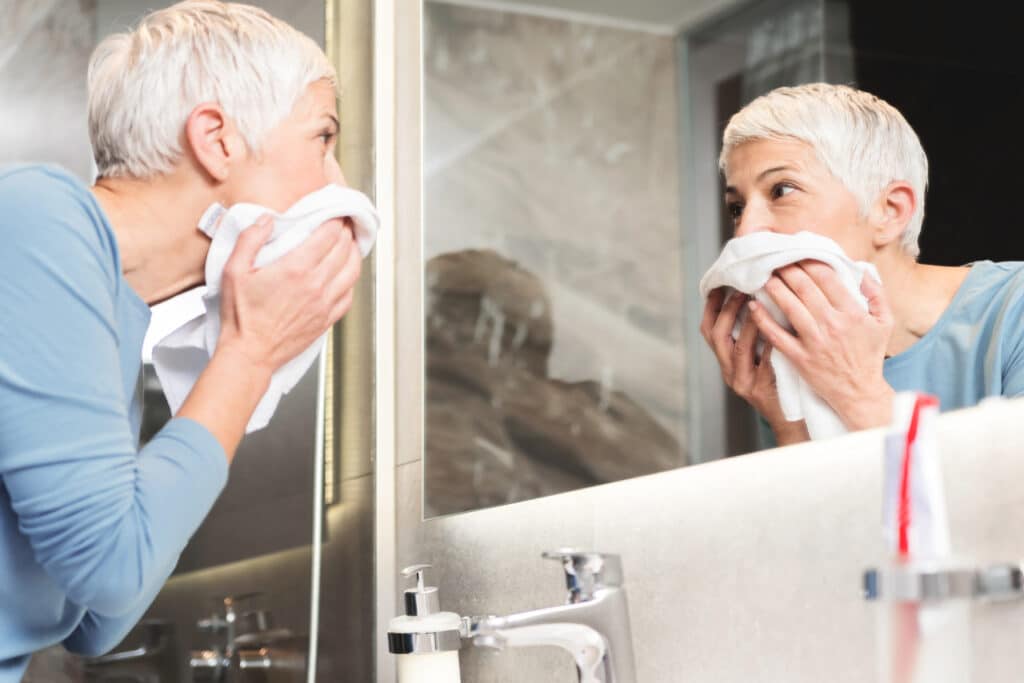
The topical medications you will receive will likely irritate and dry your skin. It is therefore important to wash your face once or twice a day to remove the residues of medications and prevent their buildup to the point they become irritating. If the doctor has prescribed you an anti-acne face wash, it is fine to use only this product for face washing. Do not overdo the washing, as it also can dry your skin and remove the skin lipids that serve a barrier function and protect your skin from outside pollutants, thus actually increasing irritation. If you have an overly oily skin, ask your doctor about a wash containing salicylic acid or glycolic acid which can help cut through the excess oil.
Moisturizers.
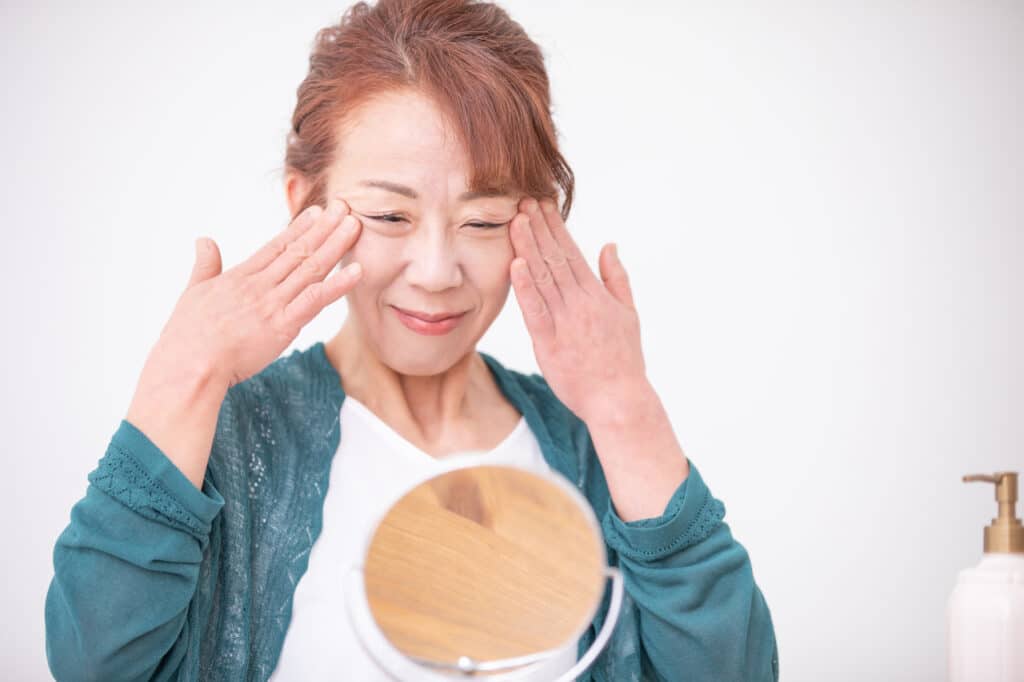
It is important to continue moisturizing the skin during menopausal acne. Moisturizers can help reduce dryness and irritation, improve barrier function of the skin and play an important role in the management of hormonal acne. Take care to use moisturizers that do not worsen acne (usually labeled as non-comedogenic or non-acnegenic). In doubt, ask your doctor of pharmacist for a right product. Chose for skin care that are absorbed easily and as free from heavy ingredients, especially such that are not absorbed by the skin (e.g. silicones). If possible, use non-scented and hypoallergenic products. Consider using pure oils, such as argan oil, as moisturizer. It is counterintuitive, but pure oils may be helpful with skincare during acne as these do not contain various potentially irritating substances that creams may have, such as emulgators or preservatives. The trick with using pure oil is to use a small amount at a time, literally one drop.
Sun protection.
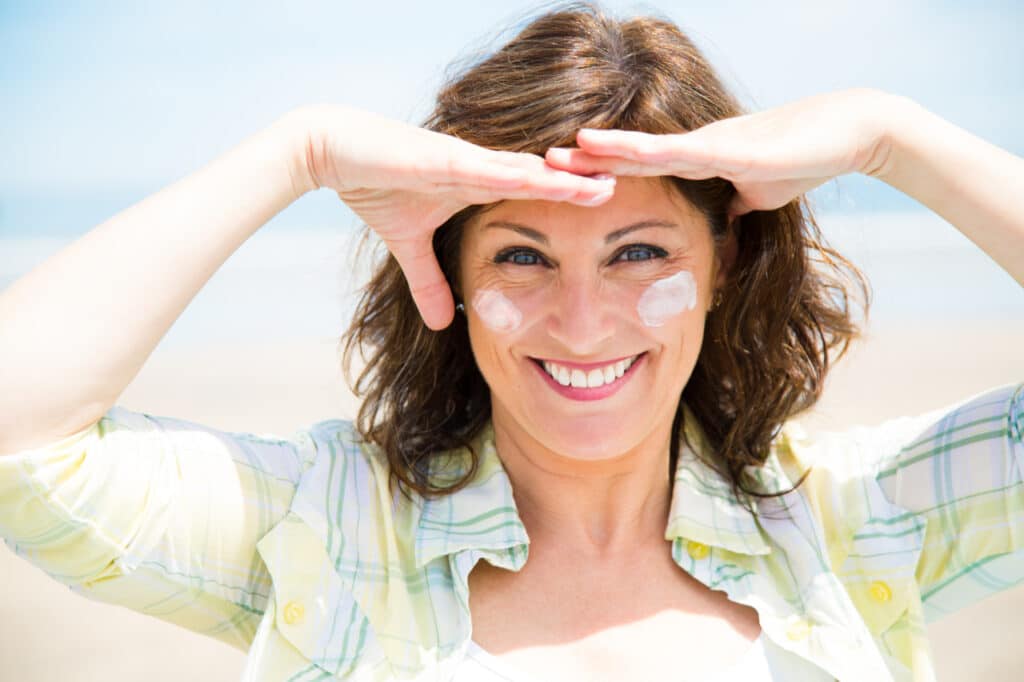
Sun protection during menopausal acne is of high importance. Under the influence of sun, acne scars can become overly pigmented and it is quite difficult to reduce this hyperpigmentation afterwards. As with moisturizers, sun care product must be light, hypoallergenic, and not worsen acne. Needless to say, tanning should be avoided for as long as menopausal acne persist.
Make up
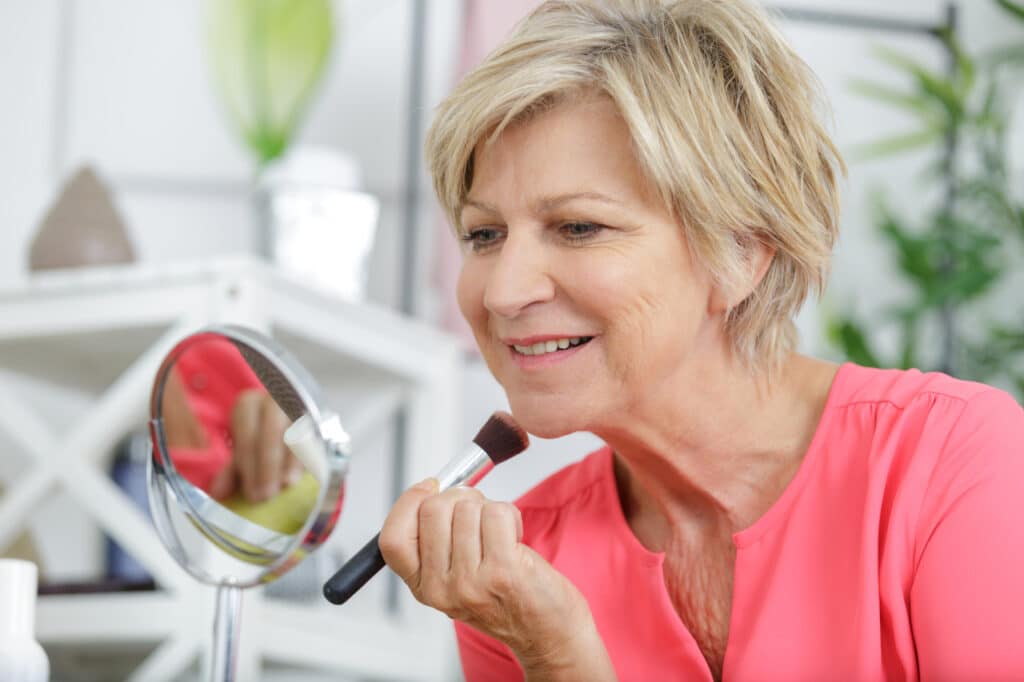
Dermatologist will probably disagree, but make-up can be really good for you during this time as it can help you cover up the acne and let you feel more confident during the day (and preventing you messing too much with the skin!). When applying makeup, it is important not the pop acne, never mind how tempting it. Popping and picking acne is strongly discouraged by dermatologists (that is where we all agree again), as it can prolong the inflammation and increase the risk of infection and scar formation. Make sure only to use fresh make up. If you see menopausal acne approaching, prepare by doing a good cleanup of your cupboard and be strict on what stays. Do not pity all these old and expired products, they will cause more trouble than their price worth. And while you at cleaning, trash all the heavy foundations you may own. A light, water-based foundation is what you need during menopausal acne. Remember to wash away all makeup before going to bed.
Specialized skincare.
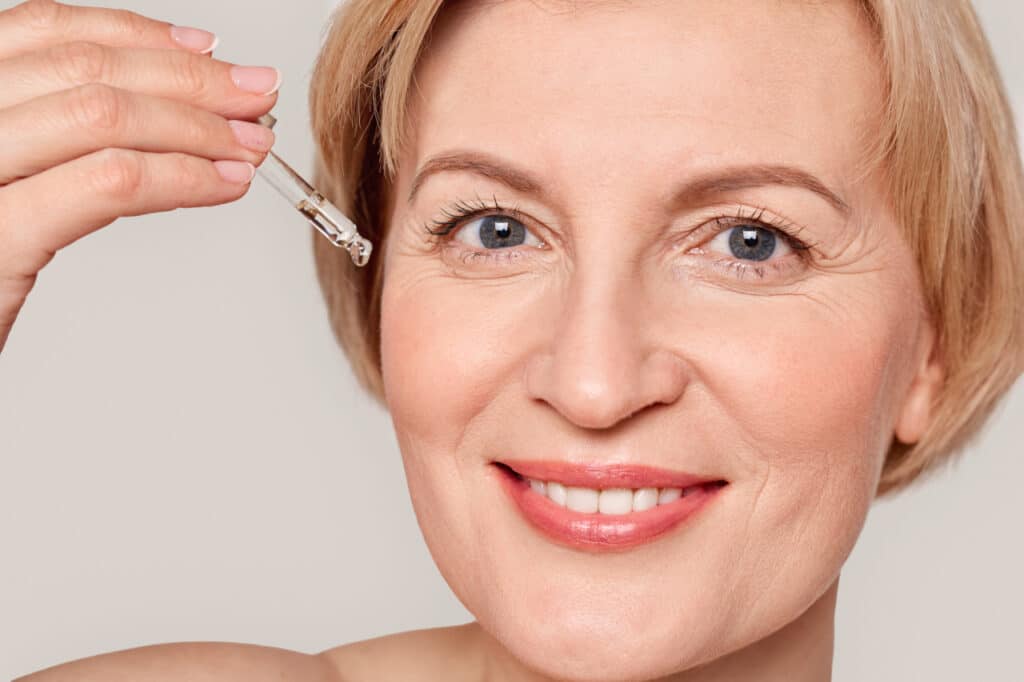
Various specialized cosmetic products for acne treatment exist that can help reign on some symptoms of hormonal acne and decrease the side effects of medications that you may receive. These are the product you may want to evaluate:
Cosmetics that reduce sebum production. These contains ingredients that reduce the flow of sebum and thus give less chance to bacteria to start a pimple.
Cosmetics with antibacterial and anti-inflammatory properties. Such products contain ingredients that can slow down bacteria, sooth the inflammation and reverse pimple formation.
Cosmetics containing nicotinamide. Nicotinamide is known to decrease the severity of mild-to-moderate acne.
Comedolytical cosmetics. “Comedone” is the blemish that forms when oil and skin cells clog the pore. “Lytic” means something that dissolves. Comedo-lytical products are these that can unclog the pores before these become pimples. Example of comedolytics are retinol alpha-hydroxy acids like glycolic acid and beta-hydroxy acids like salicylic acid.
Botanicals. Plant extracts, for example the extracts of coneflower (Echinacea purpurea) or mangosteen (Garcinia mangostana) and many others can stop the growth of bacteria on the skin and have an antiacne effect.
Going through menopause can be exhausting and frustrating and having to deal with menopausal acne in addition to the rest just sucks! The good news is that menopausal acne is a temporary condition that vanishes once the postmenopausal hormone balance has been established. By properly care for the skin, women can ensure that menopause acne remains mild and does goes away without leaving scars.
The following peer-reviewed article is referred to in this post:
Khunger N, Mehrotra K. Menopausal Acne – Challenges And Solutions. Int J Womens Health. 2019;11:555-567. Published 2019 Oct 29. doi:10.2147/IJWH.S174292. https://www.dovepress.com/front_end/cr_data/cache/pdf/download_1592298851_5ee88d6341e55/ijwh-174292-menopausal-acne-ndash-challenges-and-solutions.pdf
